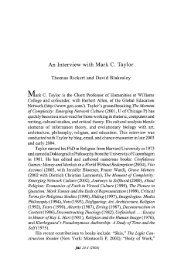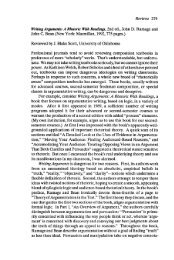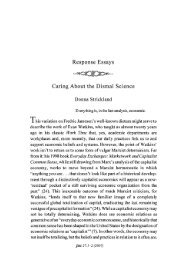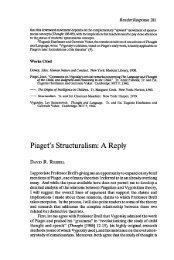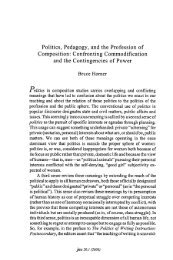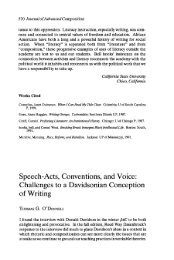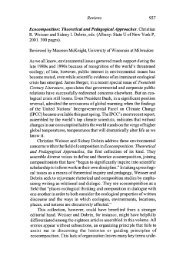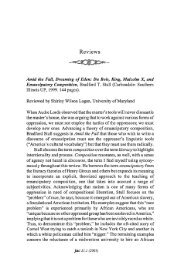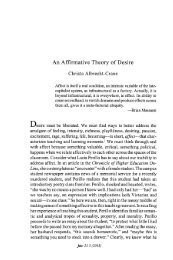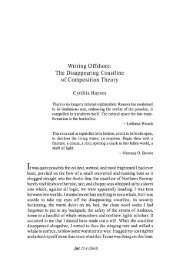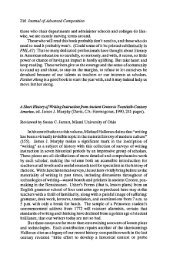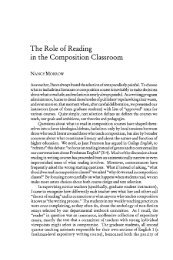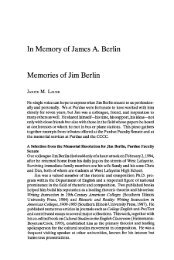Some Thoughts on Expressive Discourse: A Review ... - JAC Online
Some Thoughts on Expressive Discourse: A Review ... - JAC Online
Some Thoughts on Expressive Discourse: A Review ... - JAC Online
Create successful ePaper yourself
Turn your PDF publications into a flip-book with our unique Google optimized e-Paper software.
<strong>Expressive</strong> Writing 91<br />
I feel Harris pulling in two directi<strong>on</strong>s in her treatment of interior text.<br />
On the <strong>on</strong>e hand, she insists <strong>on</strong> the "closeness" or "relatedness" between<br />
interior text and final text. That is, using the metaphor of "embryo," she<br />
insists that the interior text carries the genes or eggs of the final text: "The<br />
idea that all discourse originates as interior text is a more accurate and<br />
generally useful theory since it suggests that the thinking that precedes<br />
writing is an embry<strong>on</strong>ic form of the final text rather than a different type of<br />
discourse" (92). Harris writes, "Unlike the expressive theory that a text<br />
comes into existence because a writer is stimulated by an urge to express his<br />
or her individual self[!], I believe that the interior text-the idea of the text,<br />
of what is needed or desirable or possible-stimulates the writer to create a<br />
physical text ... The mental c<strong>on</strong>struct of a text that occurs to a writer actually<br />
serves as the impetus for discourse. That is, the impulse to communicate or<br />
create derives from the anticipati<strong>on</strong> of a specific text" (75-6).<br />
On the other hand, she insists <strong>on</strong> maximum distance or unrelatedness<br />
between interior text and final text, for she stresses that the interior text is<br />
always n<strong>on</strong>verbal: "As Vygotsky repeatedly reminds us, thought and language<br />
are different phenomena. The difference between them creates an<br />
immense challenge for writers and readers, for, in every act of writing and<br />
reading, they must transform <strong>on</strong>e into the other" (115; emphasis added).<br />
Here's another example: "Although a writer may 'rehearse' words in his or<br />
her mind, the interior text is always more (or less) than words" (101;<br />
emphasis added). (At a time when many people are tempted to say that all<br />
knowledge is verbal, I deeply welcome her insistence <strong>on</strong> n<strong>on</strong>verbal knowledge,<br />
but her point would be less subject to Challenge ifshe t<strong>on</strong>ed it down just<br />
a bit, changing "every" and "always" to "many" and "often.") The interior<br />
text that gives rise to writing is liable to be "little more than a fleeting idea or<br />
... an image or even a rhythm," not, however, a feeling (77).<br />
But I am happy and respectful about the ambivalence or even c<strong>on</strong>fusi<strong>on</strong><br />
here because it results from her insisting <strong>on</strong> doing justice to the complexity<br />
and even mysteriousness of how writing issues from the mind. She could have<br />
made things much clearer by following Witte and restricting "interior text"<br />
to mean actual words in our head, but she c<strong>on</strong>sciously disagrees with his usage<br />
so as to let interior text be better related to the more complicated wellsprings<br />
of writing (see her 78).<br />
What I admire is that even though Harris seems to want in general to<br />
push away the expressive, here in her treatment of interior text she does not<br />
push away the complexities of what is central to people interested in the<br />
expressive: inventi<strong>on</strong>, the perplexities of where writing comes from or howwe<br />
get ideas and texts. Indeed, I'd venture to say that the whole movement that<br />
she and Berlin call expressive was centrally fueled not by some single-minded<br />
obsessi<strong>on</strong> with making every<strong>on</strong>e healthy, but by a renewed interest in<br />
inventi<strong>on</strong> and a sense of the inadequacies of previous accounts of it-or of



